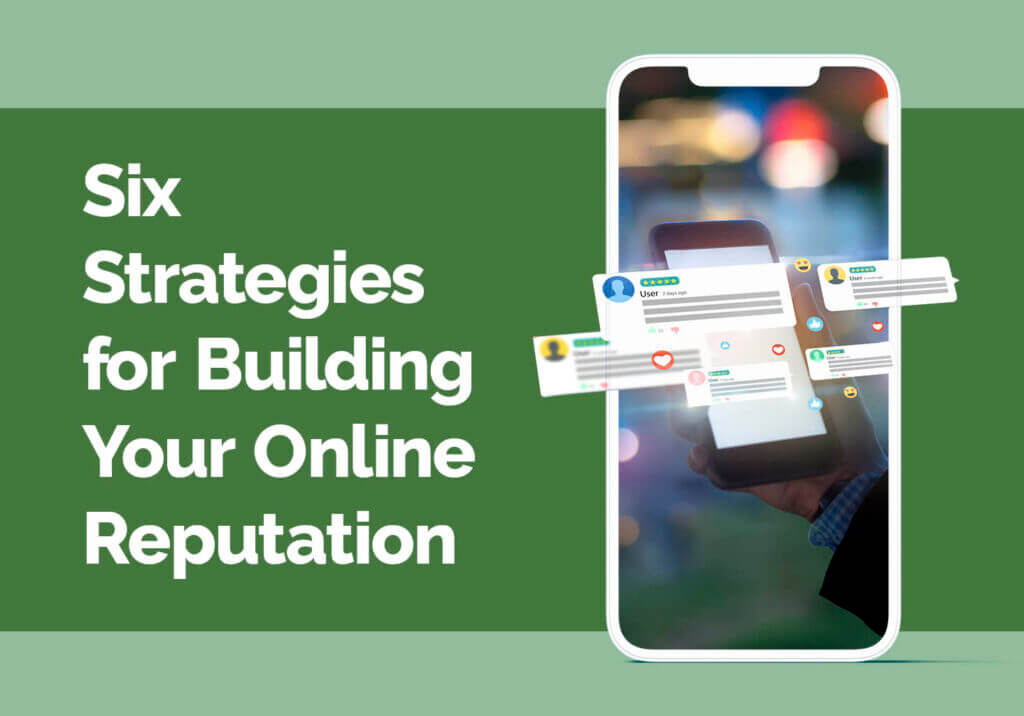Whether you’re a business owner, an entrepreneur, or a professional, your online reputation matters.
It’s how potential customers, partners, and employers perceive you. It’s what influences their decision to engage with you or not.
Building a positive online reputation isn’t just about avoiding negative reviews. It’s about strategically creating a digital footprint that reflects your values, showcases your expertise, and builds trust with your audience.
In this article, we’ll explore six key strategies for building your online reputation.
These strategies will help you enhance your brand visibility, establish your brand authority, and manage your digital footprint effectively.
Whether you’re just starting out or looking to improve your existing online reputation, these strategies will provide you with actionable steps to achieve your goals.
Let’s dive in and start building a reputation that opens doors for you online.
1. Monitor and Manage Your Digital Footprint
The first step in building your online reputation is to monitor and manage your digital footprint.
Your digital footprint is the trail of data you leave behind when you use the internet. It includes your social media posts, website content, online reviews, and more.
Why Monitoring is Essential
Monitoring your digital footprint is essential for several reasons.
First, it allows you to understand how you’re currently perceived online. This can help you identify areas for improvement.
Second, it enables you to track the impact of your reputation-building efforts over time.
Tools for Tracking Your Online Presence
There are several tools available to help you track your online presence.
Google Alerts, for example, can notify you when your name or business is mentioned online.
Social media monitoring tools like Hootsuite and Sprout Social can help you keep track of mentions on social platforms.
For a more comprehensive view, online reputation management services like Reputation.com and BrandYourself provide detailed reports and analytics.
Remember, the goal is not just to track your online presence, but to actively manage it.
Responding to Negative Feedback
Negative feedback is inevitable, but how you respond can significantly impact your online reputation.
Always address negative comments promptly and professionally.
Remember, your response is not just for the person who left the feedback, but for everyone else who will see it.
A well-handled negative review can actually enhance your reputation by demonstrating your commitment to customer satisfaction.
2. Optimize Your Content for Search Engines
The second strategy for building your online reputation is to optimize your content for search engines.
This involves using search engine optimization (SEO) techniques to improve your visibility in search results.
The Role of SEO in Reputation Building
SEO plays a crucial role in online reputation building.
When your content ranks high in search results, it increases your visibility and credibility.
Moreover, it allows you to control the narrative about your brand, as people often trust the information they find on the first page of search results.
Creating Valuable Content
Creating valuable content is a key aspect of SEO. Search engines favor content that is high-quality, relevant, and provides value to users.
This means creating content that answers your audience’s questions, solves their problems, or otherwise meets their needs.
In addition to being valuable, your content should also be unique. Avoid duplicating content from other sources, as this can harm your search rankings.
Utilizing Keywords and Metadata
Another important aspect of SEO is the use of keywords and metadata.
Keywords are the words and phrases that people use to search for information online.
By including relevant keywords in your content, you can help search engines understand what your content is about and match it to relevant search queries.
Metadata, such as title tags and meta descriptions, also plays a role in how your content is displayed in search results.
By optimizing your metadata, you can make your content more appealing to users and increase the likelihood of them clicking on your link.
3. Leverage Social Media to Enhance Brand Visibility
The third strategy for building your online reputation is to leverage social media.
Social media platforms provide a powerful way to connect with your audience, share your content, and build your brand visibility.
Choosing the Right Platforms
Not all social media platforms are created equal.
Each platform has its own unique audience and features.
Therefore, it’s important to choose the platforms that are most relevant to your audience and your brand.
Engaging with Your Audience
Once you’ve chosen your platforms, the next step is to engage with your audience.
This involves not only posting regular updates, but also responding to comments, answering questions, and participating in discussions.
By actively engaging with your audience, you can build relationships, foster trust, and enhance your online reputation.
Remember, social media is a two-way street.
It’s not just about broadcasting your message, but also about listening to your audience and responding to their needs.
Sharing Success Stories and Testimonials
Another effective way to use social media for reputation building is to share success stories and testimonials.
These can be stories of how your product or service has helped your customers, or testimonials from satisfied customers.
By sharing these stories, you can showcase the value of your brand and build credibility with your audience.
Remember, people trust the opinions of other customers more than they trust advertising.
So, sharing customer success stories can be a powerful way to enhance your online reputation.
4. Establish Brand Authority Through Thought Leadership
The fourth strategy for building your online reputation is to establish brand authority through thought leadership.
Thought leadership involves sharing your expertise and insights to help your audience and contribute to your industry.
Publishing Expert Content
One way to establish thought leadership is by publishing expert content.
This could be blog posts, white papers, case studies, or any other type of content that showcases your knowledge and expertise.
By sharing your insights and providing value to your audience, you can position yourself as an authority in your field.
Participating in Industry Discussions
Another way to establish thought leadership is by participating in industry discussions.
This could be online forums, social media groups, or industry events.
By actively participating in these discussions, you can share your insights, learn from others, and build your reputation as a knowledgeable and engaged industry player.
Don’t just participate for the sake of it.
Make sure your contributions are valuable and relevant.
Gaining Endorsements from Industry Influencers
Finally, gaining endorsements from industry influencers can also help establish your brand authority.
Influencers are individuals or organizations that have a large following and are respected in your industry.
By partnering with these influencers, you can leverage their credibility to enhance your own reputation.
Remember, the key to successful influencer partnerships is authenticity.
Make sure any endorsements are genuine and align with your brand values.
5. Encourage and Manage Online Reviews
The fifth strategy for building your online reputation is to encourage and manage online reviews.
Online reviews are a powerful tool for shaping your online reputation.
The Impact of Customer Reviews on Reputation
Customer reviews can significantly impact your online reputation.
Positive reviews can enhance your reputation, increase trust, and attract more customers.
On the other hand, negative reviews can harm your reputation and deter potential customers.
Strategies for Gathering Positive Reviews
There are several strategies for gathering positive reviews.
First, provide excellent service or products.
Satisfied customers are more likely to leave positive reviews.
Second, make it easy for customers to leave reviews.
This could be by providing a link to your review page in your emails or on your website.
Finally, don’t be afraid to ask for reviews.
Customers who have had a positive experience with your business are often happy to share their feedback.
Dealing with Negative Reviews
Dealing with negative reviews is also crucial for managing your online reputation.
First, always respond to negative reviews in a professional and respectful manner.
This shows that you value customer feedback and are committed to resolving any issues.
Second, take the feedback on board and use it to improve your products or services.
Remember, every negative review is an opportunity to learn and improve.
6. Regularly Audit and Update Your Online Assets
The final strategy for building your online reputation is to regularly audit and update your online assets.
This includes your website, social media profiles, and any other online platforms where your business is present.
Importance of Up-to-Date Information
Keeping your online information up-to-date is crucial for maintaining a positive online reputation.
Outdated information can confuse customers and harm your credibility.
Moreover, search engines favor websites with fresh and updated content, which can improve your online visibility.
Conducting a Comprehensive Online Audit
Conducting a comprehensive online audit involves several steps.
First, make a list of all your online assets.
This includes your website, social media profiles, online directories, and any other platforms where your business is present.
Next, review each asset for accuracy and consistency.
Ensure that your business name, address, and contact information are consistent across all platforms.
Finally, identify any outdated or irrelevant content and make a plan to update or remove it.
Refreshing Content and Design for Engagement
Refreshing your content and design is also important for engagement.
Fresh content can attract new visitors and keep existing ones coming back.
Similarly, an updated and user-friendly design can improve the user experience and enhance your online reputation.
Conclusion
Building a strong online reputation is a continuous process that requires consistent effort and attention.
By implementing these strategies, you can enhance your brand visibility, establish brand authority, and create a positive online presence that reflects well on your business or personal brand.




